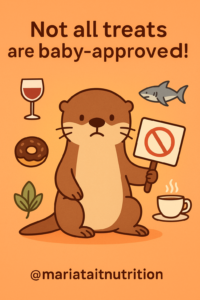Breastfeeding: Fuel for You & Baby
As a nutritionist & health coach, I get asked: What can I eat while breastfeeding? The truth — your body is amazing at prioritising baby, but you need to nourish yourself too.
Science bits:
-
Milk production uses ~500 extra kcal/day.
-
Breastmilk is ~87% water — hydration matters!
-
Nutrients in your diet can influence the levels in milk (esp. vitamins A, D, B12, iodine, selenium, DHA).
-
Baby’s gut and immune system benefit from variety in mum’s diet — flavours pass into milk, which can shape taste preferences later.
Top Nutrients & Where to Get Them
1️⃣ Protein – repair & milk synthesis (eggs, fish, poultry, lentils).
2️⃣ Omega-3 DHA – brain/eye development (salmon, sardines, chia seeds).
3️⃣ Calcium – bone health (yogurt, cheese, fortified plant milks).
4️⃣ Iron – energy & prevent anaemia (lean meat, beans, spinach).
5️⃣ Vitamin D – immune support (sunlight, fortified foods, supplements if advised).
6️⃣ Iodine – thyroid & baby’s brain (iodised salt, fish, dairy).
7️⃣ B vitamins – energy & nervous system (wholegrains, nuts, eggs).
Hydration tips:
-
Aim for ~2.5-3.5 litres/day (water, milk, herbal teas).
-
Drink to thirst + a glass at each feed.
-
Light yellow wee = good hydration check.
Fun fact: Some flavours from mum’s meals can be tasted in breastmilk within hours — so your baby might be introduced to saturday nights dinner before solids!
DM me for a personalised postpartum plan.
Facts :
-
+500 kcal/day energy needs
-
87% of milk = water
-
DHA helps brain & eye development
-
Iodine = baby’s thyroid & brain function
-
Variety now = flavour adventure later
What should you avoid?
Breastfeeding: Foods & Drinks to Limit or Avoid
Your body’s milk-making machine is incredible, but some things can pass into breastmilk and affect your baby’s digestion, sleep, or health. Here’s the science
Science bits:
-
Many compounds in food/drink cross into breastmilk within hours.
-
Babies’ immature liver/kidneys process substances more slowly.
-
Some items can cause fussiness, digestive upset, or impact nutrient quality.
Top Things to Limit/Avoid:

Alcohol
-
Passes into milk in similar levels to your blood alcohol.
-
Baby’s liver is less able to process it.
-
If you drink, wait 2–3 hours before next feed.
High Mercury Fish
-
Shark, swordfish, king mackerel, — mercury can affect brain development.
-
Safer options: salmon, sardines, trout, herring.
Excess Caffeine ☕
-
300 mg/day (~2–3 coffees) can cause irritability & poor sleep.
-
Caffeine lingers longer in baby’s system.
Highly Processed Junk Foods
-
Fine occasionally, but too much = less nutrient-dense milk for mum & baby’s needs.
Certain Herbal Supplements
-
Some herbs (e.g., sage, peppermint in high doses) may reduce supply; others unsafe for baby.
-
Always check safety
Excess Spicy/Gassy Foods? ️
-
Not unsafe, but may cause temporary fussiness. Every baby’s tolerance is different — monitor and adjust.
Fun fact: Baby’s gut takes 3–4 months to mature, so some sensitivities are temporary!
RECAP
-
Skip high-mercury fish
-
☕ Cap caffeine at ~2 coffees/day no later than midday
-
Wait 2–3 hrs after alcohol before feeding
-
Check herbs for safety
-
Every baby reacts differently
Maria Tait Nutrition
x